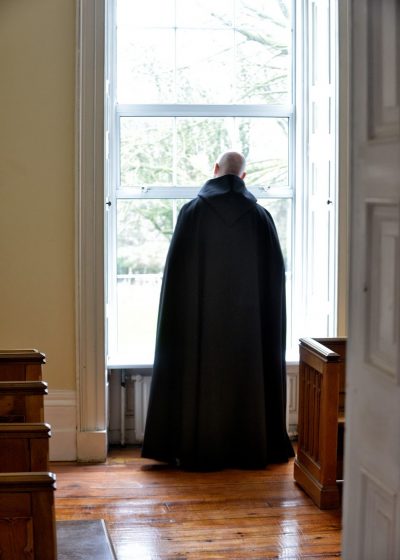The brother who is sent out on any business (LI)

CHAPTER LI. Of the Brethren who go not very far off
2 Apr. 2 Aug. 2 Dec.
Let not the brother who is sent out on any business, and hopeth to return that same day to the Monastery, presume to eat while abroad, even although pressed by any one to do so, unless perchance he have been bidden by his Abbot. If he do otherwise, let him be excommunicated.
Today’s Chapter LI is, in effect, closely connected to Chapters LXVI and LXVII, for all three chapters treat of matters related to enclosure and effective separation from the world. We monks of the 21st century are, no less than our fathers of the third and fourth centuries, called out of the world and into the desert. Without a radical leaving of the world, an effective renunciation of the concupiscence of the flesh, and the concupiscence of the eyes, and the pride of life, there is no monastic life. Listen to Saint John:
What does the world offer? Only gratification of corrupt nature, gratification of the eye, the empty pomp of living; these things take their being from the world, not from the Father. (1 John 2:16–17)
Almost inevitably, it happens that after his initial break with the world, a monk is tickled by the temptation to flirt with the world, to reconnect with worldly memories, and to re–engage with worldly pursuits. This temptation comes in a variety of guises. There is, for example, the monk who feels empty, alienated, and marginalised from the people and things that gave his life meaning. He yearns to be special in someone else’s eyes, or to be valued for his natural gifts, his intelligence, and his skills. Such a monk has forgotten that one enters the monastery, that is, one leaves the world and flees to the desert, precisely in order to become so empty, alienated, and marginalised as to have nothing left in this world upon which to stake one’s life.
Let us go forth therefore to him without the camp, bearing his reproach. For we have not here a lasting city, but we seek one that is to come. (Hebrews 13:13–14)
The response of the monk to Christ is that of our fathers, the apostles and martyrs: the resolve to forsake what the world considers a meaningful life, a life well–lived, in order to stake the meaning of one’s life on Jesus Christ alone. In the eyes of the world, the monk is a fool, a weakling, and a failure.
For see your vocation, brethren, that there are not many wise according to the flesh, not many mighty, not many noble: But the foolish things of the world hath God chosen, that he may confound the wise; and the weak things of the world hath God chosen, that he may confound the strong. And the base things of the world, and the things that are contemptible, hath God chosen, and things that are not, that he might bring to nought things that are: that no flesh should glory in his sight. But of him are you in Christ Jesus, who of God is made unto us wisdom, and justice, and sanctification, and redemption. (1 Corinthians 1:26–30)
Another temptation is more subtle, but equally dangerous. It comes in the form of a kind of whispering nostalgia that says, “Souls need your presence, your teaching, your influence, and your counsel. There is no one who can offer what you have to offer. Without leaving the monastery—that is, the desert—completely, you can, all the same, reconnect with family, friends, and institutions in the world, in order to make your unique, your special contribution”.
There are, on the one hand, entirely appropriate ways of offering the world, and even the wider Church, a life–giving message from the desert. Monks have always written, spoken, and preached and, in so doing, cared for the Body of Christ, rebuilt the Church, reformed what had become formless, and brought fire and light to souls suffering from a terrible cold and darkness. I think, for example, of Saint Bernard and, in modern times, of Blessed Marmion and Blessed Schuster. On the other hand, there are ways of engaging with the world that are altogether inappropriate and dangerous for a monk. As soon as a monk senses, or is warned by a wise elder, that he is becoming a celebrity, an ecclesiastical personality, a popular reference, he needs to withdraw into the silence of the hidden life. How easy it is to lose the little one has been given, the treasures that one has, with great difficulty and years of persevering prayer, stored up in one’s heart.
Saint Benedict would safeguard his monk from any contact with the outside world that risks making him less a monk. The abbot is responsible for protecting his monks. The monastic vocation is, especially in the first years of life in the cloister, a flame, but it is a fragile flame that needs to be protected; all too easily it can be extinguished.
I have told you often, and now tell you again with tears, that there are many whose lives make them the enemies of Christ’s cross. Perdition is the end that awaits them, their own hungry bellies are the god they worship, their own shameful doings are their pride; their minds are set on the things of earth; whereas we find our true home in heaven. It is to heaven that we look expectantly for the coming of our Lord Jesus Christ to save us. (Philippians 3:18–20)
